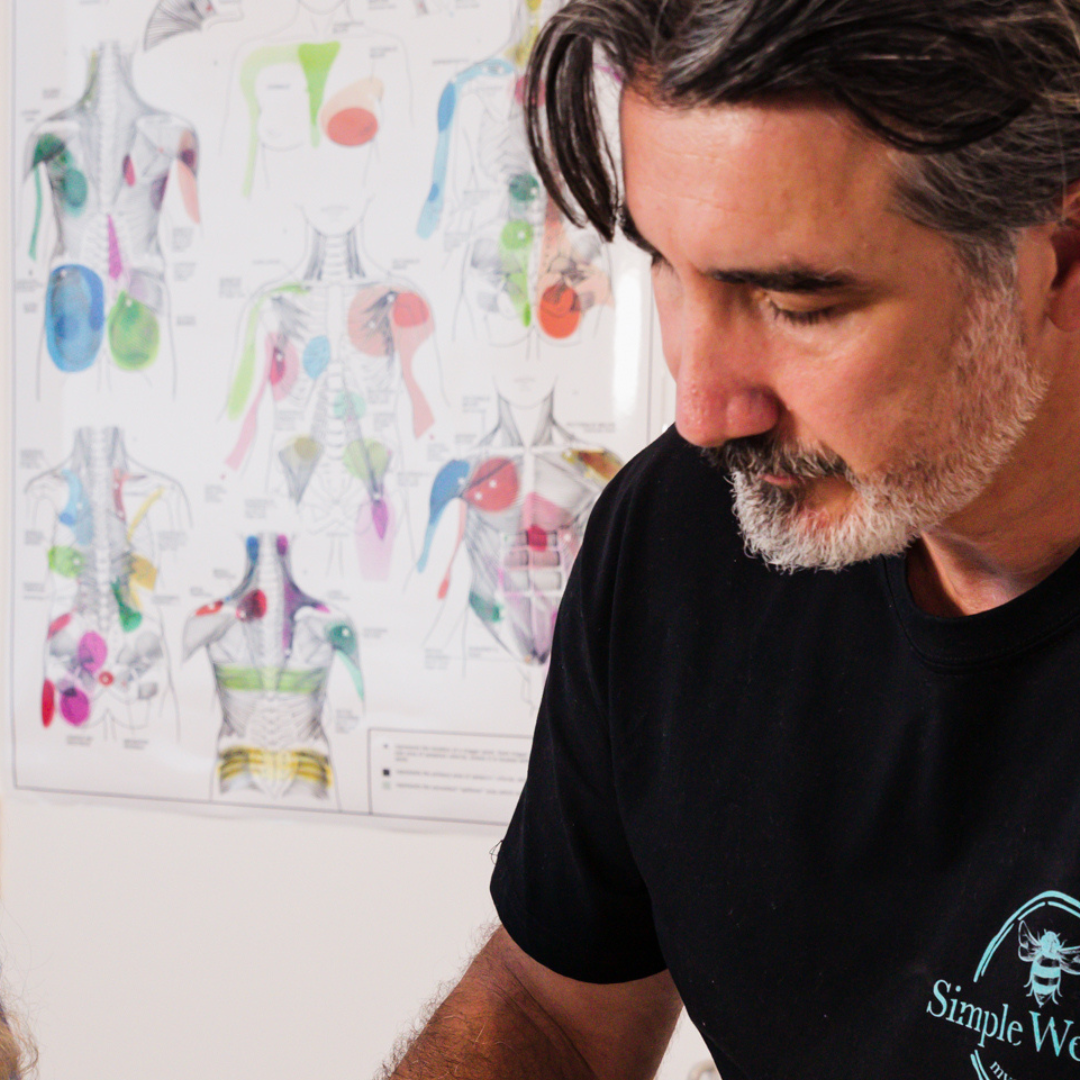Have you ever experienced those stubborn knots or tight spots in your muscles that seem to cause pain and discomfort? These localised areas of muscle tension are called trigger points. While they can be frustrating to deal with, the good news is that myotherapists are well-equipped to address these trigger points and provide effective relief.
You might have seen the classic trigger point coloured charts in your Myotherapists treatment rooms - we have them in all three of our clinic rooms and they are fantastic tools to explain some of the most well known trigger point areas and show how far away from the problem zone that referred pain can be felt.
You might have seen the classic trigger point coloured charts in your Myotherapists treatment rooms - we have them in all three of our clinic rooms and they are fantastic tools to explain some of the most well known trigger point areas and show how far away from the problem zone that referred pain can be felt.
Trigger points are hyperirritable nodules within taut bands of muscle fibers. They can develop as a result of muscle overuse, trauma, long held positions, stress, or even nutritional deficiencies. These points are typically characterized by localised pain, tenderness, and a sensation of tightness in the affected area.
They can refer pain to other parts of the body, causing discomfort in seemingly unrelated areas. Have you ever had a headache and no matter where in your head your pressed or massaged it didn't help? Chances are that your headache was being caused by a trigger point somewhere else, like in your neck, shoulders, jaw, upper back or chest. You'll be pleased to know that our Myotherapists and Remedial Massage Therapists know which muscles are likely culprits, and we're brilliant at tracking down those pesky spots that cause pain to pop up throughout your body.
Myotherapy, a specialised form of manual therapy, focuses on the assessment, treatment, and prevention of musculoskeletal pain and dysfunction. Myotherapists are trained to identify trigger points and their referral patterns, and we use various techniques to quickly and effectively address them.
Trigger points can be a source of persistent pain and discomfort, but they don't have to rule your life. Myotherapists are skilled professionals who specialise in treating these bothersome knots and helping you find relief. Through trigger point release techniques, pain management strategies, and personalised exercises, our myotherapists can address the root causes of trigger points and provide lasting relief. If you're struggling with trigger points or chronic muscle tension, seeking the expertise of a qualified myotherapist could be the key to unlocking a pain-free and more functional life. Remember, you don't have to endure the discomfort—there is help available.
Book a time to have our one our skilled experts begin your treatment plan, or phone us on 03 8204 0970 to get more information.
They can refer pain to other parts of the body, causing discomfort in seemingly unrelated areas. Have you ever had a headache and no matter where in your head your pressed or massaged it didn't help? Chances are that your headache was being caused by a trigger point somewhere else, like in your neck, shoulders, jaw, upper back or chest. You'll be pleased to know that our Myotherapists and Remedial Massage Therapists know which muscles are likely culprits, and we're brilliant at tracking down those pesky spots that cause pain to pop up throughout your body.
Myotherapy, a specialised form of manual therapy, focuses on the assessment, treatment, and prevention of musculoskeletal pain and dysfunction. Myotherapists are trained to identify trigger points and their referral patterns, and we use various techniques to quickly and effectively address them.
- Trigger Point Release: Myotherapists employ targeted pressure techniques, such as deep tissue massage, myofascial release, and dry needling, to directly target and release trigger points. By applying pressure to these specific areas, they can help relax the contracted muscle fibers and alleviate pain and tension.
- Pain Relief and Improved Circulation: Myotherapy techniques promote increased blood flow to the affected areas, facilitating the delivery of oxygen and nutrients while flushing out metabolic waste products. This helps reduce inflammation and promotes tissue healing, resulting in pain relief and improved overall muscle function.
- Correcting Muscle Imbalances: Myotherapists not only focus on treating trigger points but also work to identify and address underlying muscle imbalances. By understanding the relationship between different muscle groups, they can develop targeted exercise programs to restore balance, improve posture, and prevent trigger point recurrence.
- Stress Reduction: Stress can contribute to the development and persistence of trigger points. Myotherapists often incorporate nervous system relaxation techniques, such as deep breathing exercises, to help their clients manage stress levels. By promoting relaxation and reducing tension, they create an optimal environment for trigger point resolution.
- Education and Self-Care: Myotherapists play an essential role in educating their clients about trigger points and self-care techniques. They provide guidance on stretching exercises, ergonomic modifications, and lifestyle changes that can help manage trigger points and prevent their reoccurrence. Empowering clients with the knowledge to take control of their own well-being is a fundamental aspect of myotherapy.
Trigger points can be a source of persistent pain and discomfort, but they don't have to rule your life. Myotherapists are skilled professionals who specialise in treating these bothersome knots and helping you find relief. Through trigger point release techniques, pain management strategies, and personalised exercises, our myotherapists can address the root causes of trigger points and provide lasting relief. If you're struggling with trigger points or chronic muscle tension, seeking the expertise of a qualified myotherapist could be the key to unlocking a pain-free and more functional life. Remember, you don't have to endure the discomfort—there is help available.
Book a time to have our one our skilled experts begin your treatment plan, or phone us on 03 8204 0970 to get more information.
